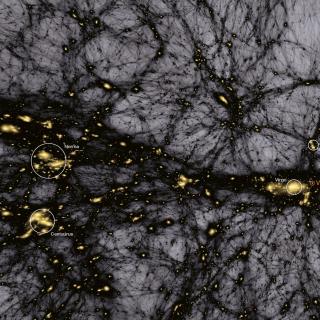Bibcode
Ata, Metin; Lee, Khee-Gan; Dalla Vecchia, Claudio; Kitaura, Francisco-Shu; Cucciati, Olga; Lemaux, Brian C.; Kashino, Daichi; Müller, Thomas
Bibliographical reference
Nature Astronomy
Advertised on:
6
2022
Citations
25
Refereed citations
19
Description
Cosmological simulations are crucial tools in studying the Universe, but they typically do not directly match real observed structures. Constrained cosmological simulations, on the other hand, are designed to match the observed distribution of galaxies. Here we present constrained simulations based on spectroscopic surveys at a redshift of z ≈ 2.3, corresponding to an epoch of nearly 11 Gyr ago. This allows us to `fast-forward' the simulation to our present day and study the evolution of observed cosmic structures self-consistently. We confirm that several previously reported protoclusters will evolve into massive galaxy clusters by our present epoch, including the `Hyperion' structure that we predict will collapse into a giant filamentary supercluster spanning 100 Mpc. We also discover previously unknown protoclusters with lower final masses than are typically detectable by other methods that nearly double the number of known protoclusters within this volume. Constrained simulations, applied to future high-redshift datasets, represent a unique opportunity for studying early structure formation and matching galaxy properties between high and low redshifts.
Related projects

Cosmology with Large Scale Structure Probes
The Cosmic Microwave Background (CMB) contains the statistical information about the early seeds of the structure formation in our Universe. Its natural counterpart in the local universe is the distribution of galaxies that arises as a result of gravitational growth of those primordial and small density fluctuations. The characterization of the
FRANCISCO SHU
KITAURA JOYANES